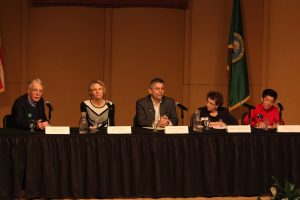By Keely Coxwell

Pictured (left to right) Professor Weinberger, Justice Stephens, Justice Gonzalez, Justice McCloud, and Justice Yu.
Photo Credit to Presley Reed III
“We travel to expose people to our process. Our court is one of the few that allows televising of meetings,” Associate Chief Justice Charles W. Johnson said. “You have to have confidence in the ethical standards that control our decisions and hopefully you get that [confidence] by us traveling.”
Justice Johnson graduated from the University of Puget Sound School of Law in 1976.
The Washington Supreme Court Justices came to the University of Puget Sound on Nov. 13 and Nov. 14 for a variety of events. The “traveling court” held two panels and later heard three appeals in Schneebeck Concert Hall that was open to the community, according to the University of Puget Sound website.
“I am the Co-President for the Pre-Law Society and over the summer we were asked to be part of the planning process. We gladly accepted,” Matthew Bell ‘20 said. “I, along with Amanda Díaz and Monica Arnone, worked to arrange student escorts for the Justices, find interested students to attend the two lunches with the Court, and reach out to students about the Monday evening reception.”
The first panel, on free speech and activism, was held on Monday. Justices Johnson, Stevens, Steven Gonzales, Deborah McCloud and Mary Yu were on the panel and Professor Seth Weinberger moderated.
Weinberger opened the panel by asking “how can we not just hear but listen to, understand, too, and learn from ideas to which we might be personally and initially oppose?”
“True listening doesn’t mean that you give up convictions it forces you to reconsider your position but it doesn’t mean that then you give up,” Justice Yu said. “The thing that I’ve learned the most is that somebody with an opposing view can help me sharpen my own view.”
Díaz ‘18 and Associated Students of the University of Puget Sound President, then asked the justices what the difference between free speech and hate speech is.
“The ability to say what you want is an ability that we all have and it comes with consequences and those consequences depend on the time and place and the manner in which you speak,” said Justice Gonzalez.
The panel was then opened up to the audience to ask questions. One audience member asked about the changing relationship between online communication and the first amendment, specifically how you can know if something that is said online is inciting violence.
“The First Amendment is a check on the government’s power. It’s not a check on private people’s power or private corporations power, so if you say something on Facebook and Facebook shuts you down that’s not a First Amendment question,” Justice McCloud said.
Chief Justice Mary Fairhurst and Justices Barbara Madsen, Susan Owens and Charles Wiggins were on the second panel of the day which addressed young people and the law and was moderated by Diane Clarkson, who is the president of the Tacoma-Pierce County Bar Association, according to the University of Puget Sound website.
Questions asked ranged from differences between the juvenile justice system and the adult justice system, to advice for people going into law school.
Justice Wiggins advised people to not be “disavowed by tales of the difficulty of the job.” He also stressed the need for minority lawyers.
The next day, Nov. 14, all nine justices gathered to hear three cases all of which were, like all of the Court’s hearings, televised statewide by public cable television TVW, according to the University of Puget Sound website.
In addition to the panels and hearings, the Justices visited multiple classes an African American/Religious Studies class, an Honors physics class, an English class, a French Studies class, and Asian Languages and Cultures class, and a Classics class. They chose these classes based on time and interest in the topic discussed in the class.
“Justice Owens and Stephens attended the honors science class on Monday and they had an amazing conversation about the role the sciences play in our legal system which is something I often don’t think about,” Bell said. “It helped me realize that their roles require them to be able to handle a vast array of legal cases.”
“I thought this was a great experience for the students. It was really a unique way for our students to interact directly with people who make important decisions. It was also great that they were able to do so in such a small group (13 students in the class). That is a level of contact and intimacy that members of the public seldom get with our Supreme Court Justices, I imagine,” Andrew Rex said. Rex is the professor of the physics class that the Justices visited.
“This visit gave us a first-hand glance at the highest judicial body in the state of Washington. This was an amazing opportunity to learn more about the judicial systems that impact all of us,” Bell said.
